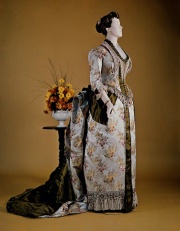Difference between revisions of "Alençon lace"
Jump to navigation
Jump to search
m (Text replace - "== Authority ==" to "== Sources Checked for Data in Record ==") |
|||
| Line 1: | Line 1: | ||
| − | [[File:59.649a-SC39624.jpg|thumb| | + | [[File:59.649a-SC39624.jpg|thumb|French dress<br>MFA# 59.649a]] |
== Description == | == Description == | ||
| Line 12: | Line 12: | ||
[[media:download_file_258.pdf|Common Types of Lace]] | [[media:download_file_258.pdf|Common Types of Lace]] | ||
| − | + | ==Resources and Citations== | |
| − | |||
| − | |||
| − | |||
| − | == | ||
* Rosalie Rosso King, ''Textile Identification, Conservation, and Preservation'', Noyes Publications, Park Ridge, NJ, 1985 | * Rosalie Rosso King, ''Textile Identification, Conservation, and Preservation'', Noyes Publications, Park Ridge, NJ, 1985 | ||
Latest revision as of 09:53, 25 April 2022
Description
A delicate needlepoint lace originally manufactured in the city of Alençon in northwest France. Alençon lace has solid, flowery designs outlined with a twisted yarn. The lace usually has a delicate, hexagonal mesh background and is 36 inches wide with one edge scalloped. Machine reproductions of Alençon lace have been made since the mid-19th century.
Synonyms and Related Terms
Alencon lace; point d'Alencon; encaje de Alencon (Esp.); Alencon kant (Ned)
Comparisons
Resources and Citations
- Rosalie Rosso King, Textile Identification, Conservation, and Preservation, Noyes Publications, Park Ridge, NJ, 1985
- Edward Reich, Carlton J. Siegler, Consumer Goods: How to Know and Use Them, American Book Company, New York City, 1937
